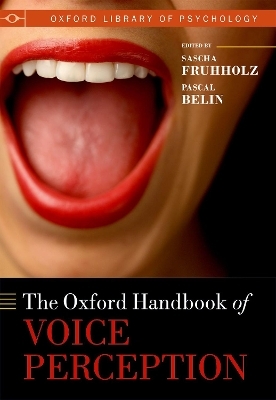
The Oxford Handbook of Voice Perception
Oxford University Press (Verlag)
978-0-19-874318-7 (ISBN)
Speech perception has been the focus of innumerable studies over the past decades. While our abilities to recognize individuals by their voice state plays a central role in our everyday social interactions, limited scientific attention has been devoted to the perceptual and cerebral mechanisms underlying nonverbal information processing in voices.
The Oxford Handbook of Voice Perception takes a comprehensive look at this emerging field and presents a selection of current research in voice perception. The forty chapters summarise the most exciting research from across several disciplines covering acoustical, clinical, evolutionary, cognitive, and computational perspectives.
In particular, this handbook offers an invaluable window into the development and evolution of the 'vocal brain', and considers in detail the voice processing abilities of non-human animals or human infants. By providing a full and unique perspective on the recent developments in this burgeoning area of study, this text is an important and interdisciplinary resource for students, researchers, and scientific journalists interested in voice perception.
Sascha Frühholz is currently SNSF Professor for Cognitive and Affective Neuroscience at the Institute of Psychology at University of Zurich, Switzerland. He is also with the Neuroscience Center Zurich, Switzerland and the Zurich Center for Integrative Human Physiology, Switzerland. He has established a unique line of research into dynamic brain patterns during the production and perception of socio-affective information in voices. Pascal Belin is professor of Neuroscience at Aix-Marseille Université and heads the Neural Bases of Communication research team at the Institut de Neuroscience de La Timone in Marseille, France. He has pioneered an original line of research on the cerebral bases of voice perception that he is now developing along an evolutionary dimension.
Part I: The Voice is Special
1: Sascha Frühholz and Pascal Belin: The science of voice perception
2: Diana Van Lancker Sidtis: Ancient of days: The vocal pattern as primordial big bang of communication
3: Pascal Belin: The "Vocal Brain": Core and extended cerebral networks for voice processing
4: Klaus Scherer: Acoustic patterning of emotion vocalizations
5: Yuanyuan Wang, Derek M. Houston, and Amanda Seidl: Acoustic properties of infant-directed speech
6: Johan Sundberg: The singing voice
7: Martin Meyer, Matthias Keller, and Nathalie Giroud: Suprasegmental speech prosody and the human brain: The acoustic and vocal features and the evolutionary architecture of the brain
8: Jody Kreiman, Bruce Gerratt: Reconsidering the nature of voice
Part II: Ontogenetic development of voice perception
9: Natacha Paquette, Emmanuelle Dionne-Dostie, Maryse Lassonde and Anne Gallagher: Voice perception in newborns and infants
10: Stefan Elmer, Eva Dittinger, and Mireille Besson: One step beyond: musical expertise and word learning
11: Evelyne Mercure and Laura Kischkel: Social perception in infancy: An integrative perspective on the development of voice and face perception
12: Katherine S. Young, Christine E. Parsons, Alan Stein, Peter Vuust, Michelle G. Craske, and Morten L. Kringelbach: Neural responses to infant vocalisations in adult listeners
Part III: Evolution and comparative perspective
13: Alan K.S. Nielsen and Drew Rendall: Comparative perspectives on communication in human and nonhuman primates: Grounding meaning in broadly conserved processes of voice production, perception, affect and cognition
14: Samantha Carouso Peck and Michael H. Goldstein: Linking vocal learning to social reward in the brain: Proposed neural mechanisms of socially guided song learning
15: Catherine Perrodin and Christopher I. Petkov: Voice sensitive regions, neurons and multisensory pathways in the primate brain
16: Attila Andics and Tamás Faragó: Voice perception across species
17: Charles T. Snowdon: Emotional and social communication in nonhuman animals
18: Josef P. Rauschecker: Dual stream models of auditory vocal communication
Part IV: Emotional and motivational vocal expression
19: Sascha Frühholz and Leonardo Ceravolo: The neural network underlying the processing of affective vocalizations
20: Silke Paulmann and Sonja A. Kotz: The electrophysiology and time-course of processing vocal emotion expressions
21: Jocelyne C. Whitehead and Jorge L. Armony: Amygdala processing of vocal emotions
22: Kai Alter and Dirk Wildgruber: Laughing out loud! Investigations on different types of laughter
Part V: Vocal identity, personality, and the social context
23: Tyler K. Perrachione: Recognizing speakers across languages
24: Stefan R. Schweinberger and Romi Zäske: Perceiving speaker identity from the voice
25: Marianne Latinus and Romi Zäske: Perceptual correlates and cerebral representation of voices-identity, gender, and age
26: Phil McAleer and Pascal Belin: The perception of personality traits from voices
27: Katarzyna Pisanski and David R. Feinberg: Vocal attractiveness
28: Sarah Stevenage: Voice processing: Implications for earwitness testimony
29: Benjamin Kreifelts and Thomas Ethofer: Voices in the context of human faces and bodies
30: Patricia E.G. Bestelmeyer: Linguistic 'first impressions': Accents as cue to person perception
Part VI: Machine-based generation and decoding of voices
31: Hideki Kawahara and Verena Skuk: Voice morphing
32: Alessandro Vinciarelli: Machine-based decoding of voices and human speech
33: Maximilian Schmitt and Bjorn Schuller: Machine-based decoding of paralinguistic vocal features
34: Bernd J. Kröger: Neurocomputational models of voice and speech perception
35: Keikichi Hirose: Voice and speech synthesis - highlighting control of prosody
36: Volker Dellwo, Peter French, and Lei He: Voice biometrics for forensic speaker recognition applications
Part VII: Clinical disorders
37: David I. Leitman and Sarah M. Haigh: Impairments in decoding vocal emotion in schizophrenia and bipolar disorder
38: Kristiina Kompus and Kenneth Hugdahl: Perception of voices that do not exist: Neuronal mechanisms in clinical and non-clinical hallucinations
39: Claudia Roswandowitz, Corrina Maguinnessa, and Katharina von Kriegstein: Deficits in voice-identity processing: Acquired and developmental phonagnosia
40: Jennifer L. Agustus, Julia C. Hailstone, and Jason D. Warren: Voice processing in dementia
| Erscheinungsdatum | 07.12.2018 |
|---|---|
| Reihe/Serie | Oxford Library of Psychology |
| Verlagsort | Oxford |
| Sprache | englisch |
| Maße | 179 x 254 mm |
| Gewicht | 1986 g |
| Themenwelt | Kunst / Musik / Theater ► Musik ► Musiktheorie / Musiklehre |
| Geisteswissenschaften ► Psychologie ► Allgemeine Psychologie | |
| Geisteswissenschaften ► Psychologie ► Biopsychologie / Neurowissenschaften | |
| Geisteswissenschaften ► Sprach- / Literaturwissenschaft ► Sprachwissenschaft | |
| Medizin / Pharmazie ► Medizinische Fachgebiete ► Neurologie | |
| Naturwissenschaften ► Biologie ► Zoologie | |
| ISBN-10 | 0-19-874318-1 / 0198743181 |
| ISBN-13 | 978-0-19-874318-7 / 9780198743187 |
| Zustand | Neuware |
| Informationen gemäß Produktsicherheitsverordnung (GPSR) | |
| Haben Sie eine Frage zum Produkt? |
aus dem Bereich


